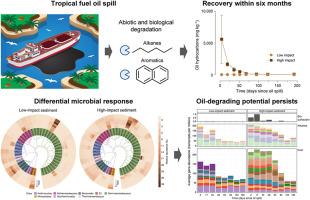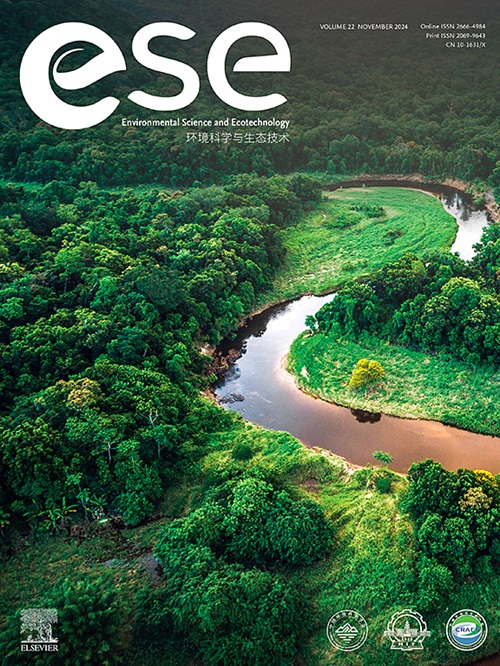Tropical intertidal microbiome response to the 2024 Marine Honour oil spill
IF 14.3
1区 环境科学与生态学
Q1 ENVIRONMENTAL SCIENCES
引用次数: 0
Abstract
Marine fuel oil (MFO) spills in tropical coastal environments are under-characterized despite increasing risk from maritime activities. Microbial and geochemical responses to the June 2024 Marine Honour MFO spill on Singapore's intertidal sediments were analyzed in real time over 185 days. Using metagenomics and hydrocarbon profiling, microbial community shifts and hydrocarbon degradation were quantified across visibly oiled (high-impact) and clean (low-impact) sites. Microbiomes at all sites adapted rapidly to the spill through increased diversity and abundance of genes encoding alkane and aromatic compound degradation, detoxification, and biosurfactant production. The dominant hydrocarbon-degrading bacteria differed markedly from those reported in other crude oil spills and in regions with different climates. Oil deposition intensity strongly influenced microbial succession and hydrocarbon-degrading gene profiles, and this reflected early toxicity constraints in heavily oiled areas. The persistence of hydrocarbon degradation genes beyond hydrocarbon detection in sediments suggested long-term functional priming may occur. The study provides novel genome-resolved insight into the microbial response to MFO pollution, advances understanding of marine environmental biodegradation, and provides urgently needed baseline data for oil spill response strategies in Southeast Asia and beyond.

热带潮间带微生物组对2024年海洋荣誉石油泄漏的反应
尽管海上活动的风险越来越大,但热带沿海环境中的海洋燃料油(MFO)泄漏尚未得到充分描述。在185天的时间里,实时分析了新加坡潮间带沉积物对2024年6月海洋荣誉MFO泄漏的微生物和地球化学反应。利用宏基因组学和碳氢化合物分析,微生物群落的变化和碳氢化合物降解在明显油污(高影响)和清洁(低影响)的地点进行了量化。通过增加编码烷烃和芳香族化合物降解、解毒和生物表面活性剂生产的基因的多样性和丰度,所有地点的微生物组迅速适应了泄漏。优势烃类降解细菌与其他原油泄漏和不同气候地区的报告明显不同。石油沉积强度强烈影响微生物演替和烃降解基因谱,这反映了重油区早期毒性限制。沉积物中烃类降解基因的持久性超过了烃类检测,这表明可能会发生长期的功能启动。该研究为微生物对MFO污染的反应提供了新的基因组解析见解,促进了对海洋环境生物降解的理解,并为东南亚及其他地区的溢油响应策略提供了迫切需要的基线数据。
本文章由计算机程序翻译,如有差异,请以英文原文为准。
求助全文
约1分钟内获得全文
求助全文
来源期刊

Environmental Science and Ecotechnology
Multiple-
CiteScore
20.40
自引率
6.30%
发文量
11
审稿时长
18 days
期刊介绍:
Environmental Science & Ecotechnology (ESE) is an international, open-access journal publishing original research in environmental science, engineering, ecotechnology, and related fields. Authors publishing in ESE can immediately, permanently, and freely share their work. They have license options and retain copyright. Published by Elsevier, ESE is co-organized by the Chinese Society for Environmental Sciences, Harbin Institute of Technology, and the Chinese Research Academy of Environmental Sciences, under the supervision of the China Association for Science and Technology.
 求助内容:
求助内容: 应助结果提醒方式:
应助结果提醒方式:


